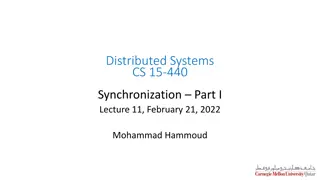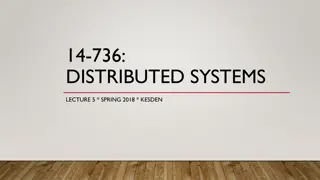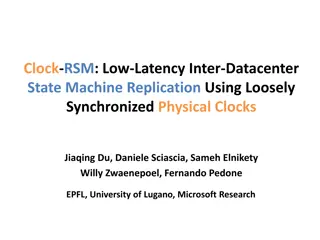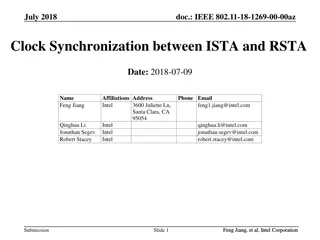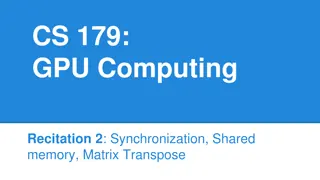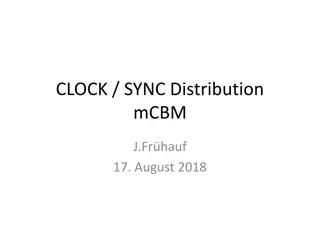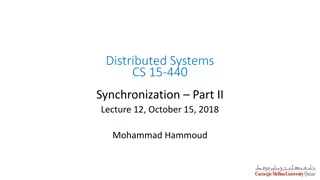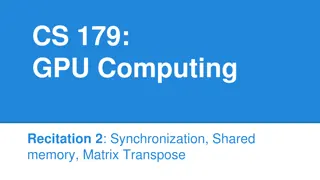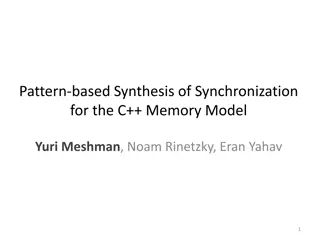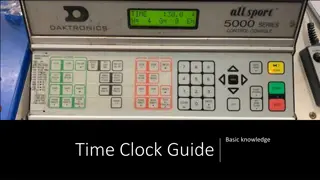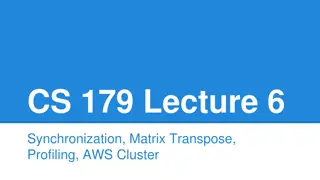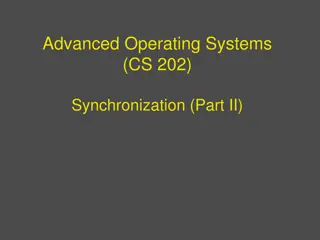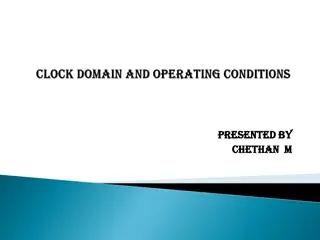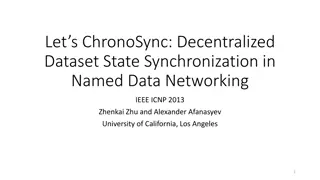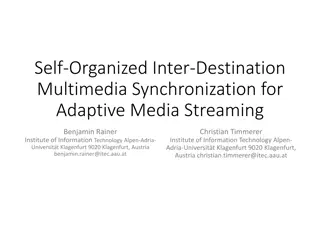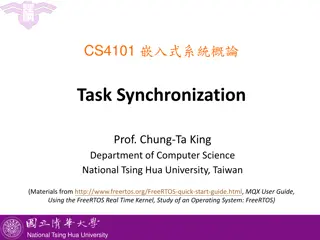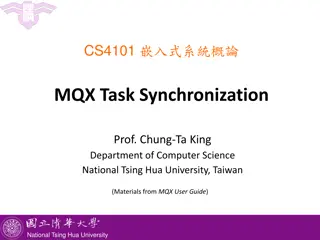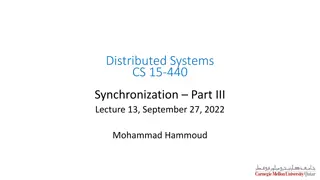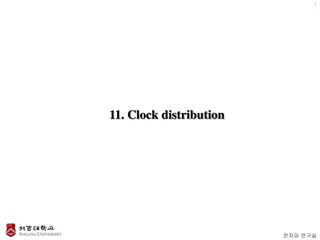Multi-Device Synchronization in JESD204B Data Converters
Exploring the complexities of achieving multi-device synchronization with JESD204B high-speed data converters. This presentation discusses advantages, disadvantages, and key considerations such as deterministic latency and clock design. Learn about requirements, tools, and synchronization strategies
0 views • 45 slides
Synchronization in Distributed Systems: Examples and Taxonomy
Understanding the need for synchronization in distributed systems is vital for ensuring correct operation. Examples such as vehicle tracking and file writing highlight the importance of entities coordinating and agreeing on events and resource access. A broad taxonomy of synchronization reasons is d
2 views • 31 slides
Network Time Protocol (NTP) for Clock Synchronization in Distributed Systems
Dive into the intricacies of Network Time Protocol (NTP) and its role in achieving precise clock synchronization in distributed systems. Explore concepts such as hierarchical organization of NTP servers, NTP protocol operation, and the significance of accurate time tracking for seamless system coord
2 views • 38 slides
The Enigmatic Clock Tower
In a captivating narrative inspired by The Clock Tower, a mysterious girl in a red dress alters reality by manipulating time through a magical clock tower window. As she embarks on a journey to restore the grey world outside, unexpected twists and deep realizations unfold, leaving readers spellbound
0 views • 16 slides
Challenges of Time Synchronization in Distributed Systems
Distributed systems face challenges in synchronizing physical time due to varying network paths and clock drifts. While physical time synchronization is useful for tasks like file timestamps, it involves complexities such as estimating communication latency and improving time estimation algorithms l
0 views • 30 slides
Determining OBS Clock Drift Using Seismic Interferometry
Determining clock errors in Ocean Bottom Seismometers (OBSs) is crucial for accurate seismic data recording. This study presents a method using ambient seismic noise and seismic interferometry to correct clock drift in OBSs. The program developed employs Python/Fortran to analyze seismic data direct
1 views • 10 slides
Efficient Support for Synchronization Without Invalidations
Addressing complex software issues like data races and inefficiencies in hardware synchronization, the DeNovoSync solution provides efficient support for arbitrary synchronization without writer-initiated invalidations. By introducing disciplined shared memory with structured synchronization and exp
1 views • 40 slides
Time, Clock Synchronization, and Atomic Clocks
Delve into the intricacies of time and clock synchronization, from the rotation of the Earth to atomic clock standards. Explore the importance of physical clock synchronization and the practical implications on technologies like GPS. Uncover the terminology and methodologies involved in achieving pr
1 views • 24 slides
Low-Latency Inter-Datacenter State Machine Replication Using Clock-RSM
Clock-RSM introduces a low-latency approach to inter-datacenter state machine replication by utilizing loosely synchronized physical clocks. This method ensures strong consistency, fault tolerance, and fast failover in a geo-replication environment. By overlapping ordering and replication using phys
0 views • 29 slides
Fun with Calendars and Clocks
Explore the world of calendars and clocks with activities, questions, and fascinating facts. From learning the number of days in different months to understanding how the hands of a clock work, dive into the concepts of time and organization. Engage in interactive tasks like marking birthdays, natio
0 views • 25 slides
Time Through Clocks
Explore the significance of knowing the time, discover the numbers on a clock, compare different clock drawings, learn how to read time using clock hands, identify various clock times, and understand activities associated with specific clock times.
0 views • 13 slides
IEEE 802.11-18-1269-00-00az Clock Synchronization Investigation
In July 2018, a document was presented by Feng Jiang et al. from Intel Corporation focusing on clock synchronization between ISTA and RSTA in IEEE 802.11-18-1269-00-00az standard. The document delves into the impact of sampling clock errors on range estimation, carrier frequency synchronization in 1
3 views • 10 slides
What's the Time, Mr. Wolf? - Fun Clock Times for Kids
Enjoy a playful journey through the clock times with Mr. Wolf in this interactive educational content. Explore different clock times such as 3 o'clock, 5 o'clock, 9 o'clock, 6 o'clock, 12 o'clock, 8 o'clock, 1 o'clock, 11 o'clock, and more. Engage in a visual quiz to identify which clock corresponds
0 views • 15 slides
GPU Computing and Synchronization Techniques
Synchronization in GPU computing is crucial for managing shared resources and coordinating parallel tasks efficiently. Techniques such as __syncthreads() and atomic instructions help ensure data integrity and avoid race conditions in parallel algorithms. Examples requiring synchronization include Pa
1 views • 22 slides
Introducing Connected Alarm Clock IoT Project
Explore the innovative Connected Alarm Clock IoT project developed by EFREI-M1-CLOCK students. This project combines traditional alarm clock features with IoT technology, allowing users to set unlimited alarms remotely. The system includes equipment such as RTC DS3231, Arduino UNO, Wi-Fi Rev2, and o
0 views • 7 slides
Clock Synchronization Distribution For Data Taking Systems
The content details the clock synchronization distribution system for data taking systems requiring specific clock frequencies for various subsystems to ensure synchronous data processing. It covers the setup, external clock relationships, and generation specifics involving different clock frequenci
1 views • 10 slides
Distributed System Synchronization and Logical Clocks
Continuing from the previous lecture on time synchronization, this session delved into logical clock synchronization, mutual exclusion, and election algorithms in distributed systems. Logical clocks, such as Lamport's Clock and Vector Clock, play a crucial role in defining the order of events withou
0 views • 33 slides
Principles of Operating Systems Synchronization Mechanisms
Operating systems utilize high-level synchronization mechanisms such as semaphores, condition variables, and monitors to provide synchronization beyond mutual exclusion. Semaphores are abstract data types that offer mutual exclusion to critical sections, while condition variables model uncounted eve
0 views • 21 slides
Synchronization and Shared Memory in GPU Computing
Synchronization and shared memory play vital roles in optimizing parallelism in GPU computing. __syncthreads() enables thread synchronization within blocks, while atomic instructions ensure serialized access to shared resources. Examples like Parallel BFS and summing numbers highlight the need for s
0 views • 21 slides
Pattern-Based Synthesis of Synchronization for C++ Memory Model
Examining the pattern-based synthesis of synchronization for the C++ memory model, this study delves into concepts like Dekker's Algorithm and achieving mutual exclusion in parallel programming. It discusses the automatic inference of efficient and correct synchronization under the C++ memory model,
0 views • 27 slides
Guide to Using a Digital Clock for Timekeeping
Learn how to set up and operate a digital clock for timekeeping purposes. This guide covers turning on the clock, setting the main clock, using basic clock functions, managing penalties, recording scores and goals, and utilizing the time-out feature. Familiarize yourself with the menu options and es
0 views • 8 slides
Parallelism and Synchronization in CUDA Programming
In this lecture on CS.179, the focus is on parallelism, synchronization, matrix transpose, profiling, and using AWS clusters in CUDA programming. The content delves into ideal cases for parallelism, synchronization examples, atomic instructions, and warp-synchronous programming in GPU computing. It
1 views • 29 slides
Concurrency Sources and Pitfalls in Scull: Understanding Synchronization
Sources of concurrency in advanced operating systems, synchronization pitfalls in Scull, memory leaks, and synchronization primitives like locks and mutexes are discussed in this content of CS 202. Learn about race conditions, protecting shared variables, and different synchronization techniques.
0 views • 25 slides
Synchronization and Scaling Challenges
Study the impact of synchronization on scaling, exploring hardware artifacts and higher-level primitives. Learn how synchronization ensures coordination, the hindrance to scalability, and the overheads that arise. Understand basic hardware artifacts like CAS, TAS, FAI, and synchronization primitives
0 views • 53 slides
Clock Domains and Operating Conditions
In synchronous logic design, clock domains play a crucial role in ensuring proper data synchronization. Explore the concept of clock domains, clock domain crossings, and operating conditions such as PVT for static timing analysis and power analysis.
0 views • 8 slides
Decentralized Dataset State Synchronization in Named Data Networking
Synchronization plays a vital role in various applications such as file sharing, group text messaging, and collaborative editing. This paper introduces ChronoSync, a decentralized dataset state synchronization protocol based on Named Data Networking (NDN). Learn about NDN architecture, ChronoSync de
0 views • 17 slides
Exploring Embedded Systems Department of ECE and ARM Serial Parallel Communication
Discover the world of Embedded Systems at the Department of ECE, created by Dr. Ravinder Nath Rajotiya at JIMS Engineering Management Technical Campus. Dive into topics like ARM Serial Parallel Communication, Communication Protocols, Transmission Modes, Clock Synchronization, and more. Learn about S
0 views • 9 slides
IEEE 1588 Based Synchronization Distribution System Implementation
Explore the practical implementation and challenges of an IEEE 1588 based synchronization distribution system in network elements. Learn about T-BC ToD synchronization, Telecom Boundary Clock functionality, and goals of network synchronization.
0 views • 14 slides
Member Synchronization and Data Management Solutions
Explore a range of solutions for member synchronization, data management, and identification process optimization. From resolving missing member data issues to implementing effective synchronization settings, enhance your operations with advanced tools and strategies. Discover the reasons behind del
0 views • 14 slides
Self-Organized Inter-Destination Multimedia Synchronization for Adaptive Media Streaming
Explore the innovative concept of Inter-Destination Multimedia Synchronization (IDMS) for adaptive media streaming, addressing challenges and detailing the architecture with session management and synchronization approaches. Learn about the synchronization points and strategies for seamless playback
0 views • 14 slides
Understanding Operating System Synchronization Principles
Explore the critical-section problem, solutions for shared data consistency, classic synchronization problems, and tools used for process synchronization in operating systems. Discover software and hardware solutions, synchronization examples, and alternative approaches.
0 views • 47 slides
Task Synchronization in FreeRTOS: Overview and Mechanisms
Explore the importance of task synchronization in FreeRTOS, including mutual exclusion, control flow, and data flow synchronization. Learn about synchronization mechanisms like queues, semaphores, and mutexes for efficient resource management in real-time operating systems.
0 views • 32 slides
Understanding Clock Domain Crossing in Digital Design
Learn about Clock Domain Crossing (CDC) in digital design, where different clock domains pose challenges in System-on-Chip (SoC) designs. Explore the concept of meta-stability, synchronization techniques, and the role of synchronizers in ensuring stable data transfer between clock domains.
0 views • 25 slides
Task Synchronization Strategies in MQX: Mutual Exclusion, Control Flow, and Data Flow
Explore the importance of synchronization in managing concurrent tasks, covering mutual exclusion, control flow, and data flow synchronization strategies within MQX. Understand the use of semaphores, mutexes, events, and more to address synchronization challenges effectively.
0 views • 46 slides
Distributed Systems Synchronization Lecture: Logical Clocks and Mutual Exclusion
Explore the concepts of logical clocks, mutual exclusion, and election algorithms in distributed systems synchronization. Learn about Lamport's Logical Clock and Vector Clock, as well as the importance of coordinating processes accessing the same resource. Dive into the significance of logical clock
0 views • 33 slides
Understanding Operating System Synchronization Concepts with Semaphores and Locks
Explore the principles of operating systems synchronization through semaphores and locks, focusing on effective resource access, performance optimization, and the historical perspective of semaphores. Learn about the importance of locks, basic locking operations, and the theoretical soundness of sem
0 views • 52 slides
Clock Signal Distribution and Optimization in Digital Systems
Explore the complexities of clock signal distribution in digital systems, addressing challenges like propagation delay, clock skew, and crosstalk. Learn about techniques and circuits used to enhance clock signal routing efficiency and improve system performance.
0 views • 23 slides
Understanding Chemical Kinetics: Clock Reactions and Reaction Mechanisms
Explore the fascinating world of chemical kinetics through clock reactions and reaction mechanisms. Learn how the rate of a reaction is determined by its slowest step, and discover the concept of clock reactions where a visible change marks a specific point in the reaction. Delve into the formaldehy
0 views • 15 slides
Understanding Synchronization Mechanisms in Computer Systems
Explore various synchronization techniques such as locks, barriers, and hardware primitives in computer science. Learn about mutual exclusion, event synchronization, global barriers, and more in this detailed study on synchronization in computer systems.
0 views • 101 slides
Technical Training: Onboard Clock System Overview
Learn about the onboard clock system accuracy, time storage methods, date/time structure, and setting options. Understand how to manually and automatically set the system clock for optimal performance and synchronization.
0 views • 18 slides

